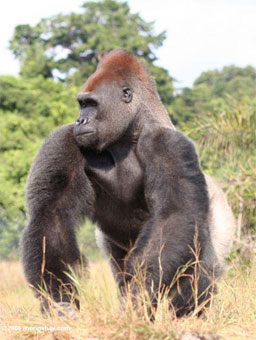Ebola outbreak in Congo kills 166
Ebola outbreak in Congo kills 166
mongabay.com
September 12, 2007
An Ebola outbreak has been confirmed in the Democratic Republic of Congo, reported the World Health Organization (WHO) on Tuesday.
Ebola is a hemorrhagic illness which causes death in 50-90% of cases. There is no known cure.
Samples from five people have tested positive for the Ebola virus in the southern province of Kasai Occidental, where authorities have reported some 166 deaths among 372 cases in the past four months, said WHO spokesman Gregory Hartl.
Médecins Sans Frontières (Belgium) has sent doctors and water and sanitation experts to the area and has established quarantine facilities.

Silverback gorilla in Gabon. Ebola outbreaks in gorillas are relatively common in Central Africa. |
The outbreak is the worst since a series of outbreaks from October 2001 to December 2003 killed 254 people in Gabon and the Republic of Congo. The worst outbreak occurred between June and November 1976, when the Ebola virus infected 284 people in Sudan, causing 151 deaths, and in the Democratic Republic of the Congo, where there were 318 cases and 280 deaths.
Because of its virulence, Ebola outbreaks are limited in extent and duration, rarely extended beyond a few villages.
The natural reservoir of the Ebola virus is unknown despite extensive studies. Although non-human primates (especially gorillas and chimpanzees) have been a source of infection for humans, they are not thought to be the reservoir. Bats are a leading candidate as a reservoir for the virus.
Related
Ebola outbreaks kill 25% of world’s gorillas.
The Ebola virus, a nasty hemorrhagic fever that causes massive organ failure and bleeding, is killing thousands of endangered gorillas across Central African forests according to new research published in the journal Science. While the findings suggests that even in strictly protected wildlife sanctuaries gorillas are not safe, the research provides insight on how to control Ebola outbreaks among wild gorillas (Gorilla gorilla) and chimpanzees (Pan troglodytes).
Ebola outbreaks may worsen with global warming. Ebola outbreaks are linked to wildlife and climate according to new research published in the journal Transactions of the Royal Society of Tropical Medicine and Hygiene. Ebola, a deadly hemorrhagic fever made famous in Richard Preston’s book The Hot Zone, periodically emerges to affect human populations in Central Africa. Until now, scientists had little understanding of the pattern behind Ebola outbreaks.














